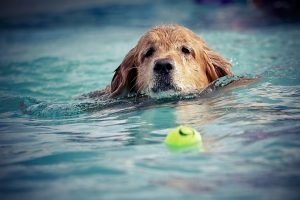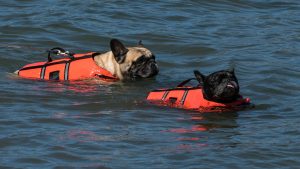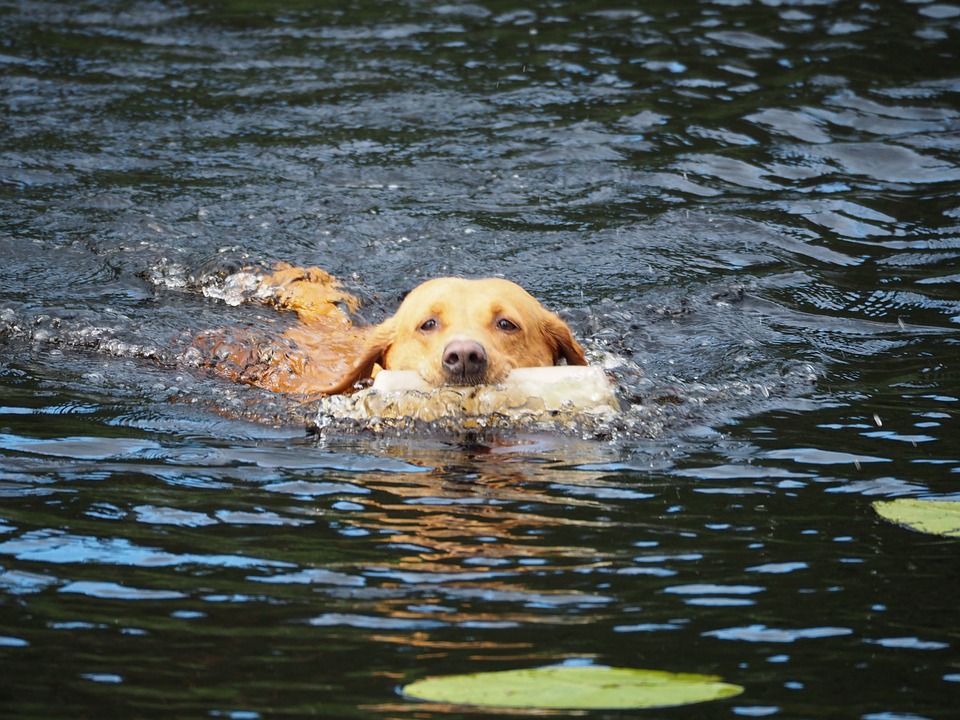With summer’s arrival, there are lots of opportunities for fun times with your pet that arrive with it. Whether you are taking your pet lakeside, beachside, or traveling in general, there are some factors to consider when your furbaby is involved. Here are some tips we’ve established to help ensure a safe, fun time for you and your pet.
 Up-to-date Vaccinations
Up-to-date Vaccinations
Going to the lake is a great way to cool off during the hot North Carolina summer. If you are bringing your pet to Lake Norman, Lake Wylie, Mountain Island Lake or any others, be sure to talk to your veterinarian about the Leptospirosis vaccine. Spread through wildlife urine, your pet can be exposed to this disease through licking up puddles or drinking lake water. This bacteria can cause liver and kidney damage, and can even be transmitted to people, so it is important to protect your pet.
Avoid Harmful Algae
Lakes or ponds can contain stagnant water which can hold harmful algae blooms. If you see green foam or algae in the water or warning signs to avoid swimming around the lake, do not allow your pet to swim. Blue green algae (cyanobacteria) can be toxic to your pet and can even be fatal. It is best to avoid swimming in areas where stagnant water occurs to prevent exposure.
Regular Heartworm, Flea & Tick Prevention
Spending time outside can mean bug bites are prevalent in the summer. Make sure your pet is receiving regular heartworm and flea and tick prevention to help protect them from exposure. Mosquitos, fleas, and ticks can be messy to deal with and cause diseases for your pet. Talk to your veterinarian with any questions or for suggestions on what products are best suited for your pet’s lifestyle.
 Swimming Safety
Swimming Safety
If your pet is out swimming, chances are, they will get hot and will need to rest. Life jackets, waterproof collar identification, and microchips are a great way to protect your pet while out and about and minimize fatigue. Be sure to bring fresh water for your pet to drink and give them multiple opportunities to rest if swimming. If your pet is on the boat with you, ensure they have proper supervision to prevent them from getting near the propeller. It can be helpful to provide shade or opportunities for them to cool off if your pet is not much of a swimmer.
Plan Ahead for Emergencies
What do you do if your pet gets hurt or lost while at the lake? Proper planning prevents sticky situations from escalating. Packing a small first aid kit with basic bandage material, benadryl, and triple antibiotic ointment can be helpful in case of bug bites or small cuts. If a situation occurs, we recommend contacting your veterinarian or going to an emergency clinic for advice and support. Talk to your veterinarian about what to do if your pet receives a bug bite or a small cut while out and about. If trouble arises, we recommend taking your pet to the emergency clinic if any serious events occur.
Microchips can be a great way to identify your pet in case they get lost or lose their collar. A microchip is a small device that is implanted under your pet’s skin by a veterinarian. These chips can be identified by any scanner at a shelter or a veterinary clinic and contains your contact information to allow your pet to be returned to you. If you are interested in having a microchip implanted, contact your veterinarian to schedule an appointment.
After Swimming Care
If your pet loves to swim, be sure to clean their ears thoroughly and bathe them after your lake adventure. Water and debris left in your pet’s ears can cause bacteria and yeast to build up and lead to painful ear infections. Pet formulated ear cleaner and cotton balls can help remove debris and build up and prevent infections from occurring. We do not recommend using apple cider vinegar or rubbing alcohol products in your pet’s ears as they can lead to irritation and can predispose pets to infection. If you notice your pet shaking their head, scratching their ears, or rubbing their ears on the floor excessively, please consult your veterinarian for advice. Be sure to remove wet collars and life jackets while drying to prevent excess rubbing which can lead to skin infections.
Get Out There and Enjoy the Lake
We hope these tips can provide helpful advice on what to expect by bringing your pet on a lake trip. By ensuring proper planning, making sure your pet is protected and up to date on vaccinations, and easily identifiable, your lake trip will be enjoyable for you and your pet.

